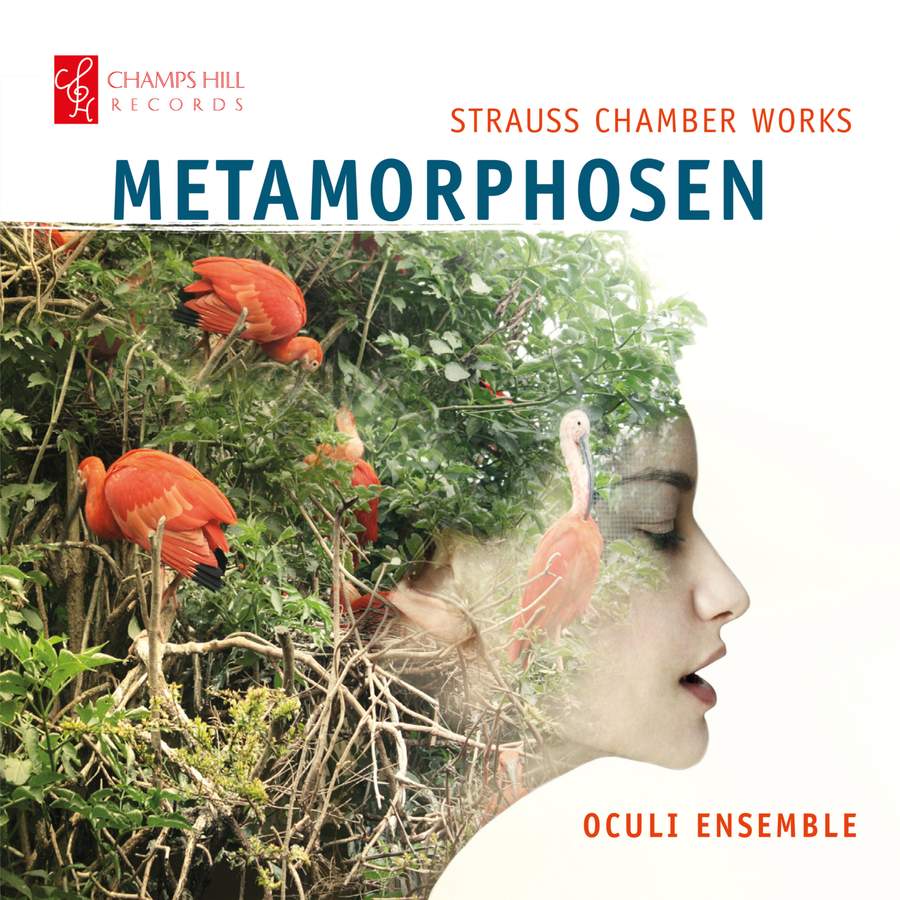STRAUSS Chamber works (Oculi Ensemble)
View record and artist detailsRecord and Artist Details
Genre:
Chamber
Label: Champs Hill
Magazine Review Date: 04/2021
Media Format: CD or Download
Media Runtime: 85
Mastering:
DDD
Catalogue Number: CHRCD155

Tracks:
| Composition | Artist Credit |
|---|---|
| Capriccio, Movement: Prelude (string sextet) |
Richard Strauss, Composer
Oculi Ensemble |
| Quartettsatz |
Richard Strauss, Composer
Oculi Ensemble |
| String Quartet |
Richard Strauss, Composer
Oculi Ensemble |
| Serenade |
Richard Strauss, Composer
Oculi Ensemble |
| Festmarsch |
Richard Strauss, Composer
Oculi Ensemble |
| Piano Quartet |
Richard Strauss, Composer
Oculi Ensemble |
| Metamorphosen |
Richard Strauss, Composer
|
Author: Jeremy Dibble
This debut recording from the Oculi Ensemble features the two extremities of Richard Strauss’s creative life, from his days as a prodigious teenager to the last decade in his life in the 1940s, when he underwent the torture of seeing the Germany he loved virtually obliterated. In two senses, then, the title of the CD, ‘Metamorphosen’, refers not only to the rich development of his style from the classical roots of his training in Munich to the mellow maturity of his valedictory years, but also to the heartbreaking transformation of Germany from its culturally rich and confident fin de siècle apogee to the devastation of the Second World War.
We know that Strauss always retained a deep love of the classical masters and especially of the music of Mozart. This love was inculcated by his conservative father (who had a major hand in his studies) and his teacher Meyer. From this formative period of his life, Strauss is best known for the Serenade for 13 wind instruments (1881) and Violin Concerto (1880 82), composed just before he entered the University of Munich, but there are other works which helpfully contribute to this musical representation of his youth. The abandoned Quartettsatz in E flat (1879), with its flamboyant opening gesture, gives us a brief glimpse of Strauss’s love of Beethoven (shades of that energy which would later open Don Juan), while the String Quartet in A (his Op 2), an accomplished work for a 16-year-old, demonstrates the thorough lessons he had learnt from the classical canon (especially from examples such as Beethoven’s ‘Rasumovsky’ Quartets). The music for piano quartet embraces a period of marked change. Ständchen (early 1880s) combines euphonious outer sections, dominated by generous melody, with a central turbulence. The later Festmarsch (1886), also a ternary structure, is a more curious amalgamation of the military and symphonic, notably in the more meditative Trio. The Two Pieces for piano quartet (1892) show a bolder, picturesque mind at work in the ‘Arabischer Tanz’ and touching ‘Liebesliedchen’, a stylistic trait encouraged by the composition of his first opera, Guntram, which he had begun that year.
Strauss’s last opera, Capriccio, written during 1940 41, was part of what is often referred to as the composer’s ‘Indian summer’. The opera itself dwells on the perennial discourse of which is the greater art: poetry or music. To make his point, in a very original gesture, Strauss opened his work with the ‘rehearsal’ of a new sextet by the character Flamand, a fine work in its own right (and at almost 11 minutes of music, a substantial movement to rival the sextets of Brahms and Schoenberg’s Verklärte Nacht). Beautifully executed by the Oculi Ensemble, the work reminds us of that pathos Strauss so munificently expressed in his ‘diatonic’ moods (and which is so abundantly expressed in the finale of the opera).
The performance of Metamorphosen, heard here in its arrangement as a septet by Rudolf Leopold, is majestic. Immensely challenging in its vast arch structure, the work’s abundant polyphony has a clarity vital to a true grasp of this expansive elegy and Strauss’s post-Wagnerian symphonicism. This is a recording that all who love not only Strauss’s instrumental music but the sumptuousness of late-Romantic chamber music will find eminently rewarding and irresistible; and over 85 minutes of music also makes it excellent value for money.
Discover the world's largest classical music catalogue with Presto Music.

Gramophone Digital Club
- Digital Edition
- Digital Archive
- Reviews Database
- Full website access
From £8.75 / month
Subscribe
Gramophone Full Club
- Print Edition
- Digital Edition
- Digital Archive
- Reviews Database
- Full website access
From £11.00 / month
Subscribe
If you are a library, university or other organisation that would be interested in an institutional subscription to Gramophone please click here for further information.




